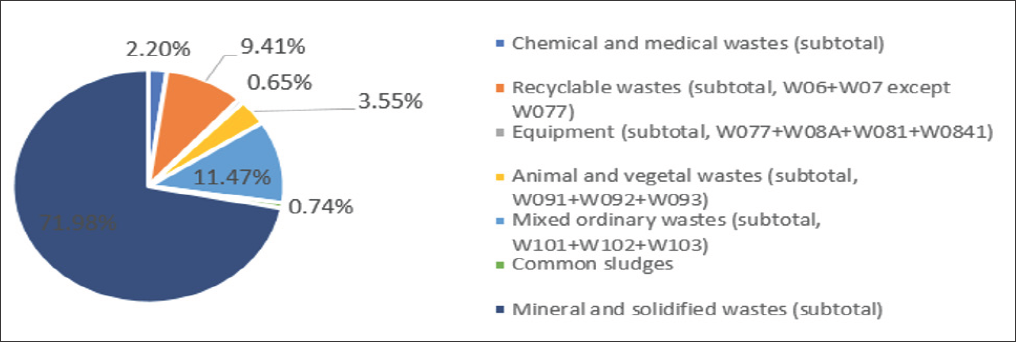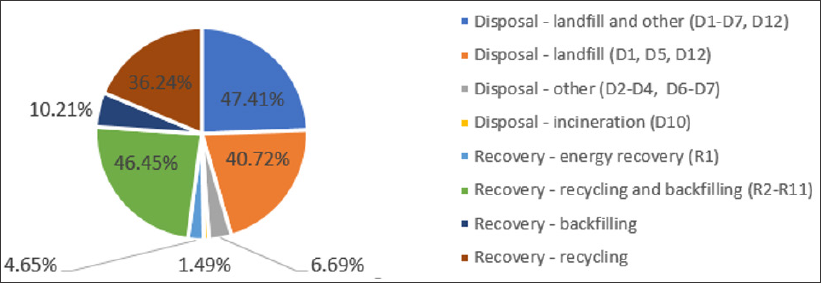Impact Factor : 0.548
- NLM ID: 101723284
- OCoLC: 999826537
- LCCN: 2017202541
Mara Madaleno*
Received: August 23, 2018; Published: August 30, 2018
*Corresponding author: Mara Madaleno, University of Aveiro, Department of Economics, Management, Industrial Engineering and Tourism (DEGEIT), Research Unit in Governance, Competitiveness and Public Policy (GOVCOPP), Campus Universitario de Santiago, 3810193, Aveiro, Portugal
DOI: 10.26717/BJSTR.2018.08.001671
Environmental pollution exists since the very beginning of life, for which waste generation contributes. Waste management and treatment is an important way to fight environmental pollution and contribute to human health improvments, provided that air, water, soil, waste and noise pollution all contribute in a negative way to increase environmental pollution provided the high level of urbanization and life standards nowadays.
Environmental pollution exists since the very beginning of life. However, it turned itself a serious problem today that threatens mankind survival [1]. It influences the air we breathe, the food we eat and the water we drink, causing the lack of natural resources, extinction of plant and animal species, damages in global ecosystems and the earth is threathned by biochemical processes. In this sense, waste generation and management have a great impact on the environment and consequently over human health. Negative consequences of human activities include air and water pollution, uncontrolled deforestation and their conversion into agricultural land, destruction of the ozone layer, global warming of the planet, climate changes, natural disasters, accumulation of various wastes (including radioactive), eradication of certain plant and animal species. These seriously endanger human's survival and it may be argued that today we live in a world of waste considering the huge amount of waste being produced every day. Figure 1 shows for the EU (current composition) the generation of waste by waste category as a percentage of total waste produced (in tonne) in 2014. In the Figure 1 it is evident that recyclable wastes are only 9.41% of the total waste generation, being mineral and solid wastes, a great part of total waste produced (71.98%).
Figure 1: Percentage of total waste by waste category in the European Union (current composition), 2014, in tonne. Source: http://appsso.eurostat.ec.europa.eu/nui/show.do?dataset=env_wasgen&lang=en, acessed on 23 August 2018.

From the wastes produced 47.41% have disposal in landfill and others and 40.72% go to incineration whereas only 36.24% turn recovered through recycling (see Figure 2 with respect to EU, in 2014, treatment of waste by waste category as a percentage of total waste treatment (in tonne). [2] addressed a review of the up-to-date literature on the "triangle of death" (environmental pollution, illegal waste disposal, and health effects) to declare that environmental pollution of waste dumping affects health through both short and long-term effects. Among the short-term effects we have those of congenital anomalies, asthma, respiratory infections, stress, anxiety, headache, dizziness, nausea, eye and respiratory irritation. Long-term health effects are those related to chronic respiratory, cardiovascular diseases, cancer, and brain, nerves, liver, lymph hematopoietic, lung and kidneys diseases [3]. In fact, burning wastes is not the most appropriate solution to solve the environmental pollution problem. As stated by [3] the illegal burning of wheels, plastics, textiles or other industrial residuals and toxic substances dumping, still represent major concerns for environmental pollution and population health.
Figure 2: Percentage of total waste treatment by waste category in the European Union (current composition), 2014, in tonne. Source: http://appsso.eurostat.ec.europa.eu/nui/show.do?dataset=env_wastrt&lang=en, acessed on 23 August 2018.

Population education for environmental pollution decreases does not even seems to be a short-run solution provided there is evidence that a higher level of education does not result in more responsible waste management [4]. Moreover, [4] also reveal a positive correlation between higher education levels and the rate of dumping waste in Slovakia, where there are many detected illegal dumping places [5]. Another damaging consequence of excessive pollution, with clear effects over human health, is that of water pollution [6]. As such, domestic and agriculture waste should not be disposed of without treating. Major sources of water pollution include industrialization, discharge of domestic waste, radioactive waste, population growth, excessive use of pesticides, fertilizers and leakage from water tanks, urbanization and weak management systems [6]. For all that has been said previously, environmental degradation can have a significant impact on human health. Important causes of the environment-related burden of disease is air pollution and exposure to hazardous chemicals.
With respect to sources of chemical pollution we may identify agriculture, industry, waste disposal and incineration, whereas the major contributors to air pollution are the transport and energy sectors [7] all over the world. However, there are opportunities to reduce environmental-related health risks and the benefits gathered from environmental policies related to health care costs reduction and increased productivity surpass the costs of implementing these policies [8,9]. Identify the sources and components of solid waste, highlighting the type and the quantity of solid waste disposed, methods of solid waste disposal and the impact of improper waste management on health, which lead to the spread of infectious diseases. As such, governments and policy makers, especially those related to environmental pollution management and reduction should take into account that the generation of waste should be decreased but for that we need a proper waste management to be undertaken to ensure it does not affect the environment and not cause health hazards to people.
Population (consumers) should be aware that organic waste can be decomposed and then used as a fertilizer, also having an important role in the reduction of pollution levels, waste generation and in the fight against environmental degradation. Producers should bear in mind the important role they also have in the economy and thus promote the production of goods which minimize waste generation after use. Both producers and consumers should bet in increased levels of material recycling and recovering, thus leading to reduced levels of waste generation and consequently allow to improve human health. Namely, the promotion of the use of plastic recycling (despite the already existent policies of pay for plastic bags in supermarkets at some European country national level) identification codes and labels, in order to turn easier, the sorting and recycling of plastic packaging. Municipalities should also play an important role by increasing their level of service to the public regarding sorting of waste, whereas also reinforcing the legislation in the waste sector, bearing in mind that the collection of hazardous waste at collection points should be safe, secure and done in an environmentally friendly way.
Not always education plays the role it should [4] but education of producers, general public and people who work in the waste sector should be increased, since it will, for example, promote the use of less hazardous alternatives to hazardous chemicals during production of goods. Thus, manufacturers should take greater responsibility for recycling, where also the general public should promote more recycling, and policies should be formulated to encourage recycling of waste. Moreover, and provided that transport and energy sectors are the most polluting ones, policies should be redirected towards the use of more renewable energy sources or less polluting energy sources, and the private transport use should be substituted by public means of transport, which will certainly contribute to lower pollution levels, improve the environment and contribute positively to human health [10,11].


